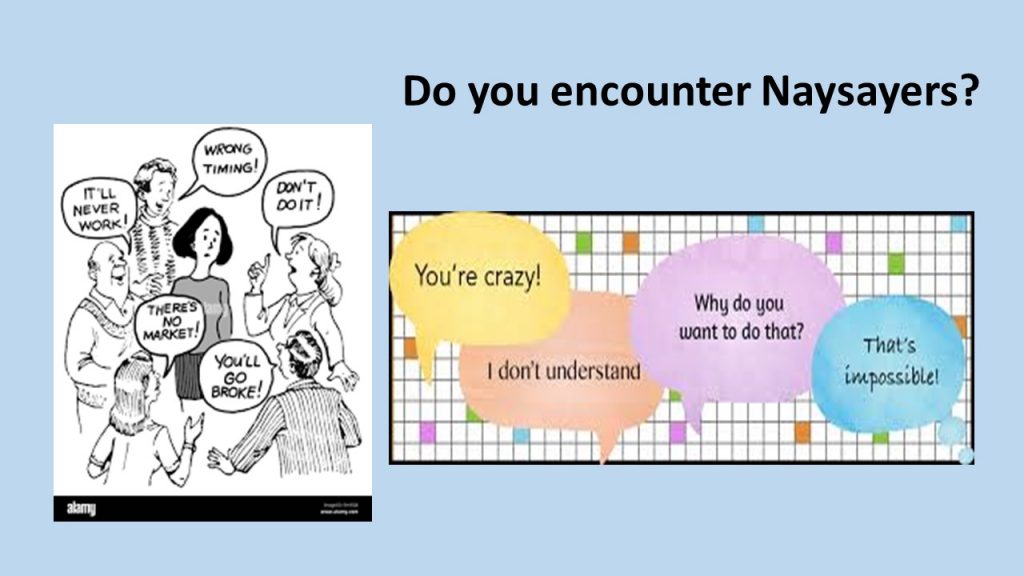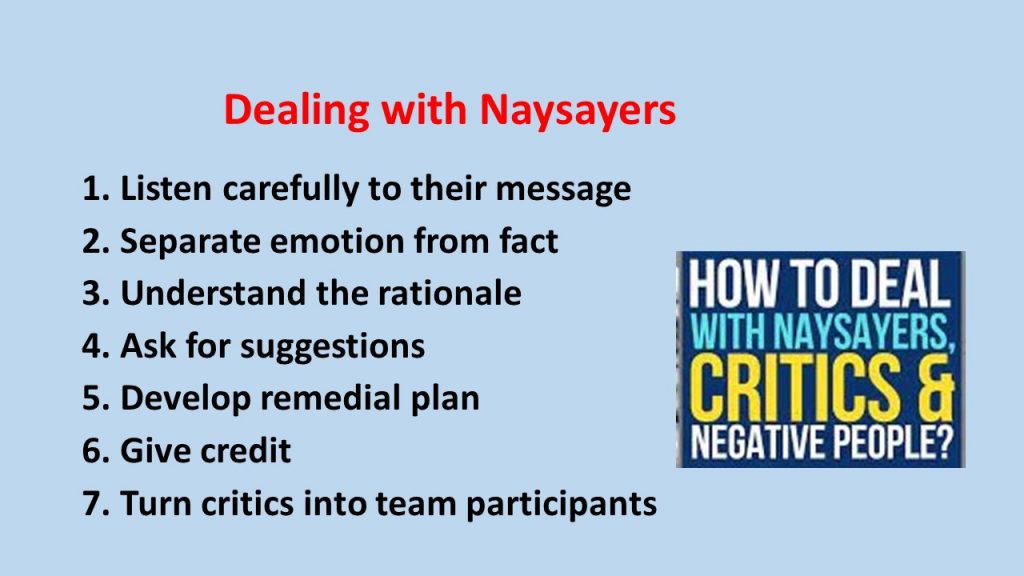
147. We Need Naysayers | 歡迎來找碴
– Musings of Dr. Jamie C. Hsu, 2.28.2023
We often encounter friends, colleagues, or family members who always seem to find fault with our work or plans. Do these naysayers irritate you or pour cold water on your enthusiasm? If so, we may have to look at these people from a different angle so we won’t be irritated by them, and even turn them into useful team members.
First, we have to understand that some people are born with the ability and inclination to see imperfections or pitfalls in a proposal or action plan. Their intention and ability are good, even though their expression and timing may not be very good. It is up to us to find ways to benefit from their “negative” capability to make our work and plans more robust and successful.
One example from my professional career was holding “devil’s advocate” meetings to review new proposals. At such meetings, a diverse group of people were invited to nitpick every element of the proposal: technical, financial, market, or customer attractiveness. Afterward, the project team would answer all the questions and concerns in a factual and objective manner. Normally we would find a few pitfalls that were neglected in the original proposal. Because we held such meetings frequently, people got used to the feedback and seldom held hard feelings toward the naysayers.
Another example of using naysayers was related to my proposal to eliminate and merge some departments in our organization. I asked all department heads to be “naysayers” and list how such a move might hurt the company and the engineers’ careers. After the deadline, even the strong naysayers could only come up with a few negative comments without significant consequences. That gave me the courage to execute this successful major organizational change.
In our lives, we need to learn how to deal with cautious or negative people and turn them into helpful allies. A few steps are listed in the accompanying chart. For example, we must not get defensive or emotional when faced with negative or challenging comments. We need to dig deeper to understand why such comments are made, and what the supporting facts are. There is a saying that “facts are friendly.” If we can separate facts from emotions, and work together to find solutions, then we can turn these naysayers, who see things differently, into our valuable partners.
In a complex and uncertain world, we do need naysayers who have the ability to see pitfalls, dangers, and omissions more clearly than ourselves.


歡迎來找碴 (2023/02/28)
-作者 許俊宸博士
-中譯 薛乃綺
我們常常會遇到有些朋友、同事或家人,似乎總是能找到我們工作或計畫中的缺點。這些”找碴”的人是否讓你感到不開心或者熱情受挫?如果是,我們也許應該要從不同角度來看待他們,這樣我們就不會被激怒,甚至能把他們變成有力的團隊後援。
首先,我們必須明白,有些人天生就具有發覺提案或行動計畫中的缺陷或缺失的能力和傾向。儘管他們的表達和時機可能不太好,但他們的意圖和能力是好的,我們應該想辦法從他們表達「負面」的能力中獲益,讓整個工作和計劃能更加全面並且成功。
來分享一個我之前在職場上的小故事。我們曾經辦過一些叫做” devils advocates’的會議,作為新提案的審查。這種會議主要就是找一群不同背景的人來挑剔提案中的每一個小缺點,包括技術、財務、市場或客戶吸引力等。這群人有時候會把整個提案給徹底毀掉,但我們也因此發現了一些之前被忽略的缺陷。當然啦,提案團隊也會好好回答他們所有的問題和擔憂。習慣了這樣的會議後,大家也就不會再對這些「反派角色」心存芥蒂了。
另一個例子是跟我過去曾經提出削減、合併和重組組織部門。當時我要求所有部門負責人都成為「反對者」,要他們列出這麼做之後將會對公司有造成什麼不利、以及可能會對工程師的職涯帶來哪些影響。結果,在截止日期後,我只收到了幾條不會造成什麼大影響的評論。有了這些結論,我終於敢大膽地去實行那次重大的組織變革,後來也證明是成功有效的。
生活中總會碰到一些愛挑毛病的人,我們應該把他們變成是有力的”盟友”。 快看看附件的圖表,裡面有幾個關鍵步驟喔!首先,我們要從更深的層次去了解他們所提出的問題背後的原因和事實。別忘了,真相是最好的朋友!如果我們能夠”就事論事”,一起尋找解決方案,那麼這些跟我們觀點不同的反派者,就可以成為我們最寶貴的夥伴!
在這個充滿著複雜和不確定性的世界中,我們真的需要那些比自己更能清楚地看到陷阱、缺陷的人。說白了,我們還是需要有愛找碴的夥伴。


